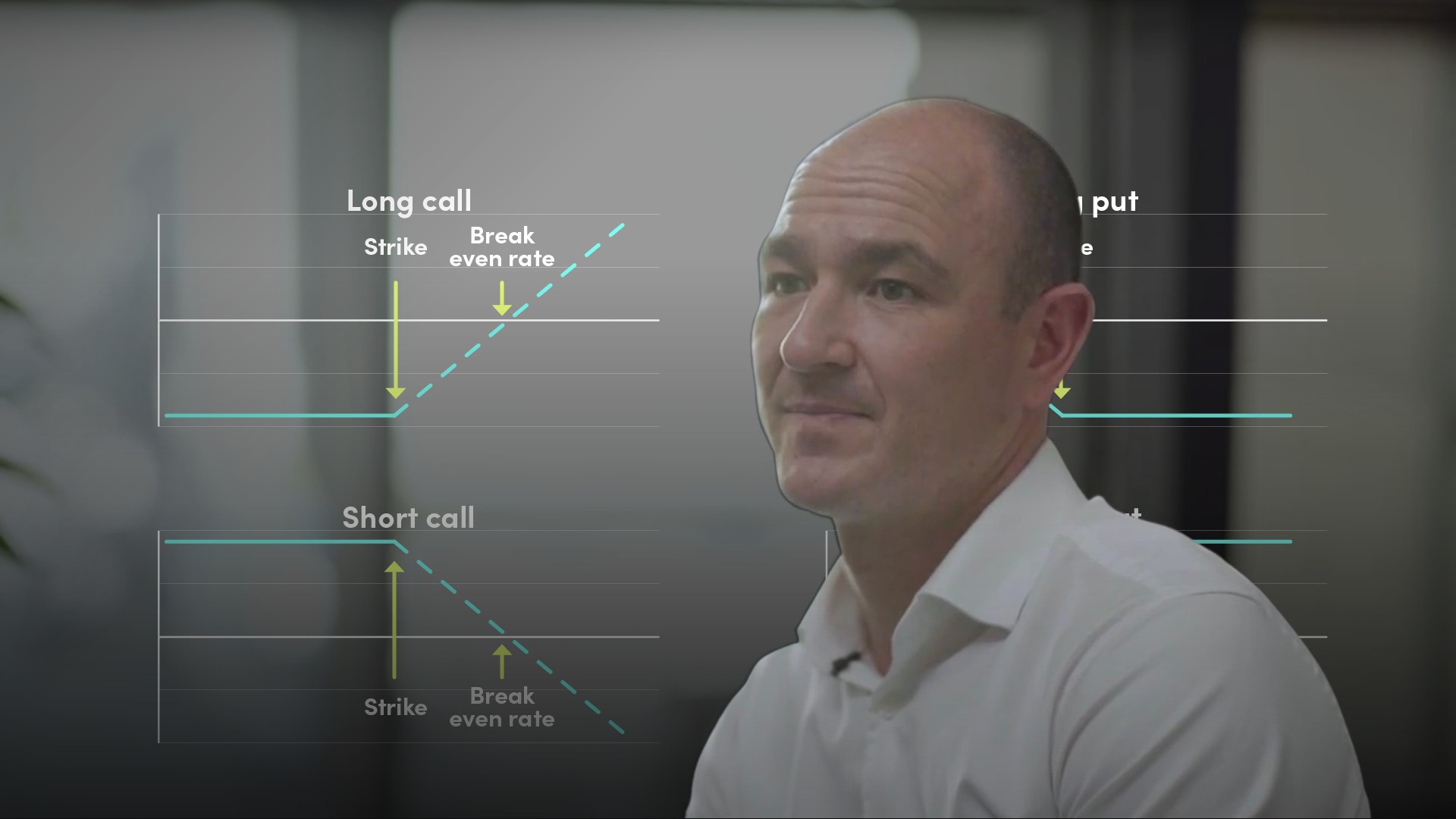
Options Jargon Buster

Lee Bartholomew
15 years: Fixed income markets
Options are financial contracts which give the buyer the right, but not the obligation, to buy or sell a financial instrument at a predefined price. Lee explains the context in which an options contract is executed and how it is priced.
Options are financial contracts which give the buyer the right, but not the obligation, to buy or sell a financial instrument at a predefined price. Lee explains the context in which an options contract is executed and how it is priced.
Subscribe to watch
Access this and all of the content on our platform by signing up for a 7-day free trial.

Options Jargon Buster
6 mins 12 secs
Key learning objectives:
Understand how options are priced and valued
Learn about the different types of options
Define Strategies, Straddles, Strangles, and Collars
Overview:
Options are financial contracts which give the buyer of the options contract the right, but not the obligation, to buy/sell a financial instrument at a predefined price on/until a set date from the contract seller, who is obligated to sell/buy the financial instrument at said price if the option is exercised.
Subscribe to watch
Access this and all of the content on our platform by signing up for a 7-day free trial.
What are the different types of options?
- Call Options – Gives the buyer the right but not the obligation to buy the underlying security at a set price.
- Put Options – Gives the buyer the right but not the obligation to sell the underlying security at a set price.
When entering an options contract, the option buyer must pay a premium to the option seller. Options contracts can be standardised and traded on-exchange, and can also be traded over-the-counter.
The strike price is the price the buyer will pay when exercising a call option, and the price the buyer will receive when exercising a put option.
When will an option be exercised?
An option will be exercised when the option buyer is in-the-money:
- For a call option, the buyer is in-the-money when the market price is above the strike/exercise price
- For a put option, the buyer is in-the-money when the market price is below the strike/exercise price
Options contracts can be both physically-settled and cash-settled. Physical settlement means the option buyer will deliver the underlying security when a call option is exercised, and will deliver the underlying security when a put option is exercised.
What factors affect Option Pricing?
- Spot Price of Underlying – the price of the underlying will determine whether an option is in-the-money, out-the-money or at-the-money depending on whether it is above, below or equal to the exercise/strike price
- Exercise/Strike Price – the exercise/strike price of the option will also determine whether an option is in-the-money,out-the-money or at-the-money
- Time to Expiration – the longer an option has until expiration, the greater chance it has for the underlying to change and expire in-the-money
What Option Strategies can be used to mitigate risk and increase reward?
STRADDLES:
- Straddles can be used to trade volatility, and are constructed using an at-the-money call and an at-the-money put option
- Long straddles profit when there is enough movement in the underlying so that one of the option’s payoffs exceeds the total premiums paid, it does not matter whether the price of the underlying rises or falls
- Investors can also short straddles, which is shorting volatility, where the investor gains the premium of selling the at-the-money call and put options and will profit if there is little movement in the underlying
STRANGLES:
- Strangles can also be used to trade volatility, and are constructed using an out-the-money call and an out-the-money put option
- Compared to straddles, strangles are cheaper due to the lower premiums because out-the-money options are cheaper than at-the-money options. However, they require greater movement in the underlying for the buyer to profit
- Investors can also short strangles, which is shorting volatility, where the investor gains the premium of selling the at-the-money call and at-the-money put options and will see profit if there is little movement in the underlying
COLLARS:
- An investor can hedge a position in the underlying with a collar
- A collar is when an investor combines their underlying position with an out-the-money long put, for downside protection, and sells an out-the-money call option
- The investors underlying position has downside limited to the exercise price of the put option, but upside is capped at the exercise price of the call option
Subscribe to watch
Access this and all of the content on our platform by signing up for a 7-day free trial.

Lee Bartholomew
There are no available Videos from "Lee Bartholomew"



























